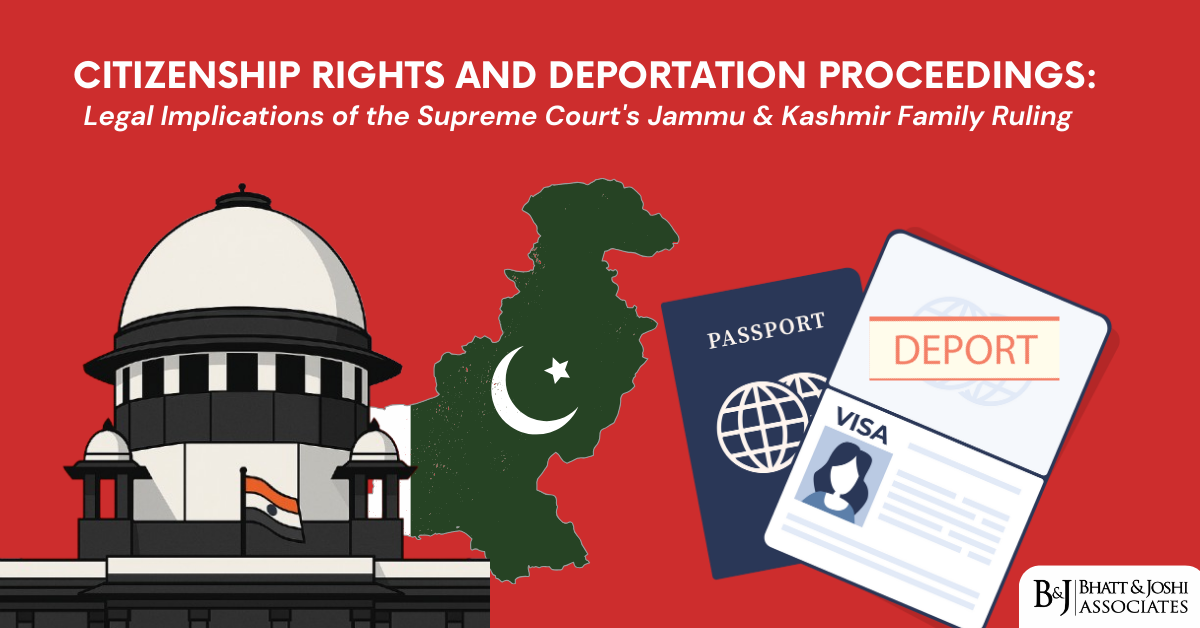I. Introduction
On May 2, 2025, the Supreme Court of India delivered a significant judgment concerning the deportation of a Bangalore-based family to Pakistan despite their claim to Indian citizenship. The case involved a man and his five family members who possessed valid Indian passports and Aadhaar cards but faced deportation orders under circumstances that raised fundamental questions about citizenship rights and due process. The Court’s decision to stay the deportation pending verification of their citizenship claims marked an important development in Indian jurisprudence concerning citizenship determination, documentation sufficiency, and procedural safeguards in deportation proceedings. This judgment is particularly significant given India’s complex citizenship framework and the sensitive geopolitical context of India-Pakistan relations. This article examines the legal reasoning behind the Court’s decision, analyzes the Supreme Court on Citizenship and Deportation ruling, and evaluates its impact on future cases involving disputed nationality, particularly in border regions and territories with complex political histories such as Jammu & Kashmir.
II. Legal Framework of Citizenship in India
A. Constitutional Provisions on Citizenship
The Indian Constitution addresses citizenship in Articles 5 through 11, establishing the fundamental framework for determining who qualifies as an Indian citizen. Article 5 confers citizenship on persons domiciled in India at the commencement of the Constitution, while Articles 6 and 7 specifically address the rights of migrants between India and Pakistan during the partition period. Article 11 empowers Parliament to regulate citizenship through legislation, providing the constitutional basis for the Citizenship Act of 1955. These provisions reflect the complex historical circumstances surrounding India’s independence and partition, acknowledging the mass population movements that occurred during that period.
B. The Citizenship Act and Subsequent Amendments
The Citizenship Act of 1955 operationalizes the constitutional provisions by establishing specific criteria for citizenship acquisition, including birth, descent, registration, naturalization, and incorporation of territory. Significant amendments to the Act include the 1986 amendment requiring that at least one parent be an Indian citizen for children born in India to acquire citizenship by birth, the 2003 amendment introducing the concept of overseas citizenship, and the controversial 2019 amendment providing an expedited path to citizenship for religious minorities from neighboring countries. The cumulative effect of these amendments has been to create a more restrictive citizenship regime, particularly for individuals with cross-border familial or historical ties.
C. Special Status Considerations for Jammu & Kashmir
Until 2019, Jammu & Kashmir enjoyed a special status under Article 370, which included distinct provisions regarding permanent residency and property rights. The abrogation of Article 370 in August 2019 and the reorganization of the state into two Union Territories fundamentally altered the legal landscape of citizenship and residency rights in the region. The Jammu & Kashmir Reorganisation Act, 2019, while integrating the region more fully into the Indian legal framework, has created transitional challenges in determining the status of residents with complex documentation histories. These changes form an essential backdrop to understanding the Supreme Court’s approach in cases involving citizenship claims from this region.
III. Factual Background of the Case
A. The Petitioner’s Circumstances
The case centered on a Bangalore-based petitioner and his five family members who received deportation notices despite possessing documentation traditionally associated with Indian citizenship. All family members held valid Indian passports issued by recognized government authorities and Aadhaar cards—India’s biometric identification document administered by the Unique Identification Authority of India (UIDAI). The family had resided in Bangalore for over a decade and maintained that they were Indian citizens originally from the Jammu & Kashmir region. The petitioner worked in the information technology sector and had been paying taxes regularly, with his children enrolled in local educational institutions.
B. The Deportation Order and Procedural History
The deportation proceedings were initiated following an intelligence report that allegedly linked the family to Pakistani origins, suggesting they had entered India using forged documents. Local authorities issued deportation notices without providing specific evidence contradicting the family’s documentation or offering a detailed rationale for questioning their citizenship status. The petitioners approached the Karnataka High Court seeking to quash the deportation orders, arguing that they were arbitrary and violated their fundamental rights under Articles 14, 19, and 21 of the Constitution. When the High Court declined to intervene, citing national security considerations, the petitioners filed a Special Leave Petition before the Supreme Court, challenging both the substantive basis of the deportation order and the procedural mechanisms through which it was issued.
IV. Supreme Court Judgment on Citizenship Verification and Deportation Proceedings
A. Supreme Court Findings on Citizenship and Deportation
In its May 2, 2025 ruling, the Supreme Court stayed the deportation proceedings pending a comprehensive verification of the petitioners’ citizenship claims. The Court held that the possession of valid Indian passports and Aadhaar cards established a prima facie case of Indian citizenship that could not be summarily dismissed without substantive evidence to the contrary. The judgment emphasized that deportation, given its severe consequences, requires adherence to strict due process standards, including providing the affected individuals with specific allegations, evidence substantiating those allegations, and a meaningful opportunity to present counter-evidence.
Importantly, the Court distinguished between administrative determination of citizenship for routine government services and judicial determination for deportation purposes, holding that the latter demands a higher evidentiary standard and more robust procedural protections. The judgment also clarified that the burden of proof in deportation proceedings shifts to the state once the individual provides prima facie evidence of citizenship through government-issued identification documents.
B. Judicial Reasoning and Constitutional Principles Invoked
The Court’s reasoning was anchored in several constitutional principles. First, it invoked Article 21’s guarantee of protection of life and personal liberty, emphasizing that deportation constitutes a severe deprivation of liberty that cannot be undertaken without due process of law. Justice Chandrachud’s opinion stated: “The right to not be deported arbitrarily is an essential component of personal liberty under Article 21. When the State seeks to expel individuals claiming to be citizens, it must adhere to procedures that are fair, just, and reasonable.”
Second, the Court relied on Article 14’s equality provision, reasoning that differential treatment in citizenship verification processes without a rational basis constitutes impermissible discrimination. The judgment noted that individuals from certain regions, particularly border areas like Jammu & Kashmir, appeared to face heightened scrutiny despite possessing the same documentation as citizens from other regions.
Finally, the Court drew on principles of natural justice, emphasizing the right to be heard and the right to know the case one has to meet. The judgment held that these principles are particularly vital in deportation proceedings, where the consequences of erroneous decisions are severe and potentially irreversible.
V. Implications of the Supreme Court Ruling on Citizenship Rights
A. Evidentiary Standards in Citizenship Determination
The Supreme Court’s ruling significantly clarifies the evidentiary standards applicable in citizenship disputes. By recognizing passports and Aadhaar cards as creating a rebuttable presumption of citizenship, the Court established a framework that balances individual rights with national security concerns. This approach requires authorities to produce specific, credible evidence contradicting the documentation rather than relying on vague suspicions or generalized security concerns.
The judgment also addresses the hierarchy of evidence in citizenship determinations, placing greater weight on passports—which are specifically issued as proof of citizenship—than on documents like Aadhaar cards, which serve primarily as identity rather than citizenship verification. This nuanced approach provides guidance to lower courts and administrative authorities regarding the relative probative value of different forms of documentation.
B. Role of Documentation in Establishing Citizenship
The case highlights the complex relationship between documentation and citizenship rights in the Indian context. While possession of government-issued identity documents creates a presumption of citizenship, the judgment acknowledges that such documentation is not conclusive. This recognition reflects the practical realities of document issuance in India, where administrative oversights, corruption, or fraud may result in improper documentation.
However, the Court established that challenges to documentation must be specific and substantiated. The judgment notes: “General allegations of forgery or fraud, without particularized evidence demonstrating how and when such forgery occurred, are insufficient to overcome the presumption created by government-issued identification documents.” This standard protects citizens from arbitrary questioning of their status while preserving the state’s ability to address genuinely fraudulent documentation.
C. Procedural Safeguards in Deportation Proceedings
Perhaps the most significant aspect of the ruling concerns the procedural safeguards required in deportation cases. The Court mandated a multi-step process: first, specific written allegations detailing the basis for questioning citizenship; second, disclosure of evidence supporting those allegations; third, a meaningful opportunity for the individual to respond and present counter-evidence; and fourth, a reasoned decision addressing the evidence and arguments presented by both sides.
Additionally, the Court held that expedited deportation procedures, which might be appropriate for recent border crossers apprehended in the act, cannot be applied to long-term residents with established lives and government-issued documentation. This distinction creates a sliding scale of procedural protections based on the individual’s ties to India and the documentation they possess, reflecting principles of proportionality and fairness.
VI. Broader Impact on National Security and Human Rights
A. Balancing Security Concerns with Constitutional Rights
The judgment carefully navigates the tension between national security imperatives and individual rights. While acknowledging legitimate state interests in controlling immigration and preventing unauthorized entry, the Court emphasized that these interests cannot justify procedural shortcuts or evidentiary presumptions that systematically disadvantage individuals claiming citizenship. Justice Khanna’s concurring opinion noted: “National security is undoubtedly a paramount concern, but it is precisely in cases implicating security that adherence to constitutional principles becomes most critical.”
This balanced approach provides a framework for future cases involving similar tensions. Rather than creating a binary choice between security and rights, the judgment establishes a methodology for addressing both concerns through appropriate procedural mechanisms and evidentiary standards tailored to the specific context.
B. International Law Considerations
Although primarily decided on constitutional grounds, the judgment references international legal principles regarding statelessness and due process in deportation proceedings. The Court cited the Universal Declaration of Human Rights’ recognition of the right to nationality and the prohibition on arbitrary deprivation of nationality. Similarly, it acknowledged the International Covenant on Civil and Political Rights’ procedural protections for aliens facing expulsion.
While these international instruments were not determinative, their invocation signals the Court’s awareness of global human rights standards and suggests that Indian jurisprudence on citizenship and deportation is evolving in conversation with international legal developments. This approach reflects India’s engagement with the international legal order while maintaining the primacy of domestic constitutional principles.
VII. Future Legal Trajectory and Policy Considerations
The Supreme Court ruling on citizenship and deportation will likely influence both judicial approaches to citizenship disputes and administrative policies regarding deportation proceedings. Lower courts will need to apply the evidentiary standards and procedural requirements articulated in the judgment, potentially resulting in more rigorous scrutiny of deportation orders and greater protection for individuals with documentary evidence of citizenship.
On the policy front, the judgment may prompt administrative reforms in how citizenship verification is conducted and how deportation decisions are made. The Ministry of Home Affairs may need to develop more detailed guidelines for immigration officials, ensuring that citizenship challenges are based on specific evidence rather than generalized suspicions or profiling.
The case also highlights the need for comprehensive documentation reform to address the gap between legal citizenship status and documentary proof. Initiatives such as digitization of legacy records, standardization of verification procedures, and integration of different identification systems could help reduce uncertainty and arbitrary decision-making in citizenship determinations.
VIII. Conclusion
The Supreme Court’s May 2, 2025 ruling in the Jammu & Kashmir family deportation case represents a significant development in Indian citizenship jurisprudence. By establishing clear evidentiary standards, robust procedural safeguards, and a balanced approach to competing interests, the Court has provided a framework that protects individual rights while acknowledging legitimate state concerns about immigration control and national security.
The judgment reflects a sophisticated understanding of citizenship as both a legal status and a lived experience, recognizing that long-term residents with government-issued documentation have legitimate expectations of procedural fairness and substantive justice. At the same time, the Supreme Court on Citizenship and Deportation preserves the state’s authority to address cases of fraudulent documentation or misrepresentation through appropriate legal channels.
As India continues to navigate complex questions of identity, belonging, and borders, this ruling offers a constitutional compass for balancing competing values in a manner that upholds both security and rights. The challenge ahead lies in translating these judicial principles into administrative practices that are consistent, transparent, and respectful of human dignity.
References
- Constitution of India, 1950, Articles 5-11, 14, 19, 21.
- Citizenship Act, 1955 (as amended up to 2024).
- Jammu & Kashmir Reorganisation Act, 2019.
- LawStreet Journal, “Supreme Court Bars Deportation of Jammu & Kashmir Family,” May 2, 2025.
- Jayal, N.G. (2023). Citizenship and Its Discontents: An Indian History. Harvard University Press.
- National Human Rights Commission v. State of Arunachal Pradesh, (1996) 1 SCC 742.
- Universal Declaration of Human Rights, Articles 15.
- International Covenant on Civil and Political Rights, Article 13.














